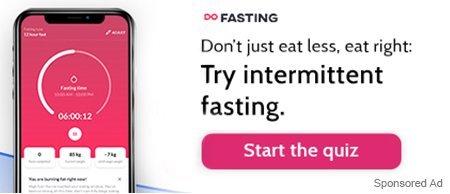Intermittent fasting science | Caloric Intake | What can stop intermittent Fasting from Working
You might have heard a lot of talk about intermittent fasting at the gym or in magazines. So, how does intermittent fasting work?
If you are trying to lose weight, you are probably thinking of what you are eating. Not many people think about when they are eating. This is the key element to intermittent fasting.
Intermittent fasting is the practice of restricting the times in which you eat. This is no fad. “IF” as it is often abbreviated, has both psychological and mental benefits.
This post will show you why so many people are turning to this way of life.
What is Intermittent Fasting?
So, how does fasting work anyway? IF is not a way of starving yourself. Instead, you eat in one window during the day or restrict calories on certain days of the week.
The 16:8 diet means 16 hours of fasting, followed by an 8-hour window in which you can eat. Some people also opt for the 5:2 diet, eating normally for 5 days of the week, and on 2 chosen days, fasting by eating a fraction of their daily maintenance calories.
This type of fasting may help you to burn fat. It can also help to regulate your insulin levels. More on the benefits later on.
Fasting – Rooted in History?
It helps to think about how our ancestors used to eat. Long before people had fridges to keep revisiting over the course of the day, it was common to only eat once a day, or even less frequently.
More and more evidence is accumulating that our bodies cope better with eating in a smaller window of time.

How Does Intermittent Fasting Work – The Science
There is more emerging scientific evidence for how intermittent fasting works.
Mark P. Mattson, Ph.D. is a leading figure in intermittent fasting. Mattson’s studies show that fasting can make the body enter ketosis. This means that you burn fat reserves instead of using glucose for your body’s energy. If you want, you can even track this yourself using a ketone monitor.
Intermittent fasting also drops the levels of insulin in your blood. This further aids weight loss.
Why does our body react in this way? Well, your body doesn’t “know” when your next meal is coming, and it needs to get energy from somewhere. This is the whole reason why bodies store fat.
In a state of fasting, the body starts to use glucose, stored in the liver. Eventually, it will use the fat reserves you have built up for energy. Mattson claims that “It takes 10 to 12 hours to use the liver’s energy stores, then what happens is, fats are used for energy.”
Intermittent Fasting Has Plenty of Benefits Beyond Fat Burning…
Does fasting work exclusively for weight loss and fat burning? It may surprise you that there are a lot of other medical benefits.
The insulin reduction we’ve already mentioned helps to reduce your chances of getting type 2 diabetes.
On top of this, intermittent fasting is strongly linked to cellular repair within the body. This study shows how intermittent fasting can help to clear out the waste from cells, promoting quick repair and replenishment.
WebMD claims that fasting can help “stabilize blood sugar levels, increase resistance to stress, and suppress inflammation” as well as “decrease blood pressure and cholesterol levels, and improve resting heart rate.”
More studies are needed for a full understanding, but the evidence is overwhelmingly positive that fasting does work.
Caloric Intake Still Matters when doing Intermittent Fasting
When you consider the basics, intermittent fasting works in a similar way to other diets. You are restricting calories into the body.
There are many different types of diet, and intermittent fasting is popular because of all the medical benefits we’ve discussed, but that doesn’t mean you can fill your 8-hour eating window with chocolate.
Restricting the calories you are eating is still key to losing weight. People take different approaches to their 8-hour window, but a sensible diet with a caloric deficit is advisable.
If you want to speed up weight loss and push your body into the state of ketosis more often, a low-carb or keto diet plan can help.

How Intermittent Fasting Gives Your Eating Structure (and Keeps You Feeling Full)
Not only does fasting work for your body, but it can also work well for your brain. It encourages routine, something we should all embrace for weight loss.
If you are doing one of the popular 16:8 or 18:6 diets, that means there is a relatively short window in which you can eat.
It feels counterintuitive, but eating in a shorter window can make you feel more full. You’re less likely to snack.
Plan your 8-hour window for the times in which you are most active. You might prefer 10 am – 6 pm or even 12 pm – 8 pm as your eating windows. It might be that you don’t want three meals in that time, and go down to two or even one meal and a snack.
Eating in fewer “sittings” is helpful. According to Harvard Health, “between meals, as long as we don’t snack, our insulin levels will go down and our fat cells can then release their stored sugar, to be used as energy.”
There is likely to be an adjustment period while your body gets used to your new routine, but it should only take a few days.
Benefits Of Intermittent Fasting
Promotes Weight Loss
One of the common reasons people consider fasting is weight loss, and if you too aim to do so, all you need is to consume fewer calories than your body burns in a day. By doing that, you can trigger a calorie deficit, which is what fasting does to your body.
So by fasting for a day, you won’t provide your body with any calories, and your body will start burning calories as needed for energy, thereby promoting weight loss.
Enhancing your metabolism is also a way to lose weight, and intermittent fasting can promote this. The body’s metabolism increases in the early fasting period and is escorted by increased plasma norepinephrine which happens due to a fall in the serum glucose.
Other benefits of fasting once a week include:
- Production of the growth hormone
- Better brain functioning
- Prevent the risk of developing diabetes
- Reduce chances of acquiring cardiovascular diseases
- Delays aging signs
Intermittent fasting (IF) works in various ways to promote weight loss and greater health. To understand more about its benefits, read- 8 Benefits Of Intermittent Fasting: A Complete List.
Does Intermittent Fasting Work For Everyone?
No diet is a one-size-fits-all solution, but most people can safely fast with no concerns.
The reasons why intermittent fasting works are simple human biology. If you fast in a safe way using the 16:8, 18:6, or 5:2 methods, you should lose weight and become healthier.
Intermittent fasting relies on you having some body fat stored. If you are underweight, you should not take this approach to your diet.
You should also consult with a doctor or medical professional before fasting if any of the following apply:
- You have diabetes or gastrointestinal conditions.
- You have low blood pressure.
- You are on any sort of medication.
- You’ve got a history of eating disorders.
- You’re pregnant, breastfeeding, or trying to get pregnant.
- You have amenorrhea.
- Your body doesn’t regulate blood sugar normally.
These things don’t mean you definitely can’t fast, but medical advice is a good idea.
What Can Stop Intermittent Fasting From Working?
The human metabolism is widely understood. Scientists can even measure ketosis.
If intermittent fasting is not working for you, the causes are likely listed below.
- You could be breaking your fast without knowing it. Protein powders, milk, and alcohol are some of the culprits.
- You may be measuring incorrectly. Don’t look exclusively at the scale. Human weight fluctuates. You might be retaining water or building muscle. Weigh infrequently.
- You might be eating too much in the eating window. Your body can still store excess calories as fat in this time, defeating the purpose. Make sure you are in a caloric deficit.
Conclusion
In the simplest terms, intermittent fasting works by telling your body to dip into fat reserves for energy. By avoiding food deliberately for a large part of the day, you can make your body go into a fat-burning mode.
On top of that, lower blood sugars and benefits for cellular repair have been noted in some huge studies. Intermittent fasting is not the only route to weight loss, but it comes with many more scientifically-proven benefits.
To make life easier when starting out with intermittent fasting, you can work with one of our 21-day meal plans. This way, you can ensure you’re only eating the right things, and you don’t have to spend hours working out what groceries you need. Our meal plans are designed for both effectiveness and convenience.












